- Home
- Richard Lee Byers
Unclean: The Haunted Lands Page 3
Unclean: The Haunted Lands Read online
Page 3
“The election of a new zulkir is an internal matter for the order in question. It won’t look well if folk realize we’re trying to influence the outcome.”
“Which is why the business requires your deft and subtle touch. Samas has the gold to buy support wherever it can be purchased. You and your minions will dig for information we can use to persuade electors not susceptible for bribery, and in general, do whatever you can to shape opinion among the transmuters. Make Samas seem a demigod and his opponents worms. Do you understand?”
She shrugged. “Of course. Bribery, blackmail, and slander, the same game we usually play.”
“Excellent. I knew I could count on you.” He raised the yellow rose, saw that it had already blackened and withered in his grasp, and with a sigh tossed it away.
The ironbound door was below street level. Bareris bounded down the stone steps and pounded until the hatch set in the center of the panel opened. A bloodshot eye peered out, and its owner said, “What’s the password?”
“Silver.” Bareris lifted a coin for the doorkeeper to see.
The other man chuckled. “Close enough.” A bar scraped as it slid in its mounts, then the door swung open. Bareris tossed the silver piece to the doorkeeper and advanced into the cellar.
The place had a low ceiling and a dirt floor. The flickering light of a scattering of tallow candles, stuck in wall sconces or empty wine bottles in the centers of the tables, sufficed to reveal the gamblers hunched over their cards and dice, the whores waiting to separate the winners from their profits, and the ruffians on hand to keep order and make sure the house received its cut of every wager. The tapers suffused the air with eye-stinging smoke and their stench, which mingled with the stinks of stale beer and vomit.
Bareris cast about until he spotted Borivik Iltazyarra. Tammith and Ral’s father was a stocky fellow with a weak mouth and close-set eyes, which were currently squeezed shut as if in prayer. He shook a leather cup, clattering the dice inside, then threw them down on the table. They came up losers, and he cursed and flung the cup down. The croupier raked in the coins.
Bareris started forward then felt just how furious he was. He paused to take a long, deep breath.
It calmed him to a degree, but not enough to keep him from grabbing hold of Borivik’s shoulders and tumbling him out of his chair and onto the floor.
The croupier jumped up and snatched for one of the daggers in his braided yellow belt. Another tough came running. Two of the gamblers started to rise.
Bareris sang a succession of rapidly ascending notes in a tone strident as a glaur horn. Power shimmered through the air. The croupier yelped and recoiled, wetness staining his crotch. His fellow ruffian balked, dropped his cudgel, and backed away trembling, empty hands raised to signal that he no longer intended any harm.
Bareris knew the two irate gamblers weren’t experiencing any magical terror. He hadn’t been able to cast the effect widely enough to engulf everyone, but the display of arcane power evidently made them think better of expressing their displeasure, because they froze then settled back down in their chairs.
Bareris raked the room with his gaze. “Does anyone else want to meddle in my business?” From the way they all refused to meet his eye, it seemed no one did. “Good.” He pivoted back around toward Borivik, who was still sprawled on the floor.
“Bareris!” the older man stammered. “My boy! You … couldn’t do that before.”
In point of fact, he couldn’t. For as long as Bareris could remember, he’d possessed a knack for the magic implicit in music, but it was only during his wanderings that it had evolved into a genuinely formidable talent. The ventures he’d undertaken to make his fortune had required that he become a more powerful bard and a stronger swordsman, or else perish.
But he wasn’t here to talk about such things. “I saw Ral,” he said. “He tried to tell me what happened to Tammith, but he was too upset to make the details clear if he even understands them. You tell me.”
Boravik swallowed. “It was all her own idea. I would never even have thought of such a thing.”
“Damn you!” Bareris snarled. “Just tell it, or I’ll sing the eyes out of your head.”
“All right. We … owed coin. A lot. To bad people.”
“You mean, you owed it.”
It was maddening. Boravik was a skilled potter, or at least he had been once. There was no reason he shouldn’t have lived a comfortable, prosperous life, but after his wife died bearing Ral, and it became clear the child was simple, he’d taken to drink, and when he drank, he gambled.
“Have it your way,” Boravik said with a hint of sullenness. He made a tentative motion as if to rise, waited to see if Bareris would object, then drew himself clumsily to his feet. “I made the wagers, but the White Raven gang was going to hurt all three of us if I didn’t pay. You remember what they’re like.”
“Go on.”
“Well, you know Ral can’t work. Maybe I could have, but no one will hire me anymore. Tammith did work, but earning a journeyman’s wages, she couldn’t make enough. Time was running out, and she decided that, to save us all, she needed to … sell herself.”
“And you went along with it. You let your own daughter become a slave.”
“How was I supposed to stop her, when neither of us could think of another answer? Maybe it won’t be so bad for her. She’s a fine potter. Good as a master, even if she hadn’t worked long enough to claim her medallion. Whoever buys her, it will surely be to take advantage of her talents.” Or her beauty, Bareris thought and struggled to suppress the images that rose in his imagination. “Maybe her owner will even let her keep a portion of the coin she earns for him. Maybe in time she can buy her free—”
“Stop prattling! Curse you, I promised I’d come home with enough wealth to give Tammith everything she could ever want.”
“How were we supposed to know it would be this month or even this year? How were we supposed to know you were still alive, or that you still felt the same way about her?”
“I … don’t know and it doesn’t matter anyway. When did Tammith surrender herself?”
“A tenday ago.”
A tenday! It was maddening to think that if Bareris had only bade farewell to his comrades and taken ship a little earlier, he might have arrived soon enough to prevent what had happened.
Yet a tenday was also reason for hope. Thay was a large and populous realm possessed of tens of thousands of slaves, but since Tammith had given up her liberty so recently, it should still be possible to trace her.
“I’m going to find Tammith and bring her home,” Bareris said. “You get out of this place and don’t come back. Use the coin your daughter gave you to pay the White Ravens and care for Ral, as she intended. If I come back to find you’ve drunk and gambled it all away, I swear by Milil’s harp that I’ll cut you to pieces.”
The snores and slurred mumblings of the sleeping slaves weren’t particularly loud, nor was the smell of their bodies intolerably foul. Lying in the midst of them, Tammith Iltazyarra suspected it was actually fear and sadness keeping her awake. In any case, awake she was, and so she stared up into the dark and wondered how things might have been if she’d spoken her heart six years before:
I don’t care if we have coin. You’re the only thing I need. Stay in Bezantur and marry me today.
Would Bareris have heeded her?
She’d never know, because she hadn’t said it or anything like it. How could she, when she’d perceived what was in his heart? He’d said he needed to go for the sake of their future, and he meant it, but he also wanted to go, wanted to see foreign lands and marvels and prove himself a man capable of overcoming uncommon challenges and reaping uncommon rewards.
Maybe that had been because he was of Mulan descent, hence, at least in theory, a scion of the aristocracy. She, a member of the Rashemi underclass, had never had any particular feeling that she was entitled to a better life or that it would prove her unworthy if she failed to achieve it. He might
have believed differently, knowing that at one time, his family had been rich and then lost everything.
Well, no, not everything. They’d still possessed their freedom, and with that reflection, dread clutched her even tighter, and sorrow sharpened into abject misery.
She lay helpless in their grip until someone off to her left started to cry. Then, despite her own wretchedness, she rose from her thin, scratchy pallet. The barracoon had high little windows seemingly intended for ventilation more than illumination but enough moonlight leaked in to enable her to pick her way through the gloom without stepping on anyone.
The weeping girl lay on her side, legs drawn up and hands hiding her face. Tammith knelt down beside her, gently but insistently lifted her into a sitting position, and took her in her arms. Her fingers sank into the adolescent’s mane of long, oily, unwashed hair.
In Thay, folk of Mulan descent removed all the hair from their heads and often their entire bodies. Rashemi freemen didn’t invariably go to the same extremes, but if they chose to retain any growth on their scalps at all, they clipped it short to distinguish themselves from slaves, who were forbidden to cut it.
Soon, Tammith thought, I’ll have a hot, heavy, filthy mass of hair just like this, and though that was the least of the trials and humiliations the future likely held in store, for some reason, the realization nearly started her sobbing as well.
Instead she held her sister slave and rubbed her back. “It’s all right,” she crooned, “it’s all right.”
“It’s not!” the adolescent snarled. She sounded angry but didn’t try to extricate herself from Tammith’s embrace. “You’re new, so you don’t know!”
“Someone has been cruel to you,” Tammith said, “but perhaps your new master will be kind and wealthy too. Maybe you’ll live in a grand house, wear silk, and eat the finest food. Maybe life will be better than it’s ever been before.”
Even as she spoke them, Tammith knew her words were ridiculous. Few slaves ended up in the sort of circumstances she was describing, and even if you did, how contemptible you’d be if mere creature comforts could console you for the loss of your liberty, but she didn’t know what else to say.
Light wavered through the air, and something cracked. Tammith looked around and saw the slave trader standing in the doorway. An older man with a dark-lipped, crooked mouth, he looked odd in his nightclothes and slippers with a blacksnake whip in one hand and a lantern in the other.
She wondered why he’d bothered to come check on his merchandise in the dead of night when he already employed watchmen for the purpose. Then a different sort of man came through the door behind him, and she caught her breath.
chapter two
10 Mirtul, the Year of Risen Elfkin
Despite its minute and deliberate imperfections, the sigil branded on Tsagoth’s brow stung and itched, nor could his body’s resiliency, which shed most wounds in a matter of moments, ease the discomfort. The blood fiend wished he could raise one of his four clawed hands and rip the mark to shreds, but he knew he must bear it until his mission was complete.
Perhaps it was the displeasure manifest in his red-eyed glare and fang-baring snarl that made all the puny little humans cringe from him—not just the wretches scurrying in the streets of Bezantur, but the youthful, newly minted Red Wizards of Conjuration guarding the gate as well. Tsagoth supposed that in the latter case it must have been. With his huge frame, lupine muzzle, and purple-black scaly hide, he was a monstrosity in the eyes of the average mortal, but no conjuror could earn a crimson robe without trafficking with dozens of entities equally alien to the base material world.
In any case, the doorkeepers were used to watching demons, devils, and elementals, all wearing brands or collars of servitude, come and go on various errands, and they made no effort to bar Tsagoth’s entry into their order’s chapter house, a castle of sorts with battlements on the roof and four tiled tetrahedral spires jutting from the corners. A good thing, too. He could dimly sense the wards emplaced to smite any spirit reckless enough to try to break or sneak in, and they were potent.
Inside the structure he found high, arched ceilings supported by rows of red marble columns, faded, flaking frescos decorating the walls, and a trace of the brimstone smell that clung to many infernal beings. He tried to look as if he knew where he was going and was engaged in some licit task as he explored.
No one questioned him as he prowled around, and after a time he peered into yet another hall and beheld a prison of sorts, a pentacle defined in red, white, and black mosaic on the floor. The design caged two devils, both displaying the ire of spirits newly snared and enslaved. The kyton with its shroud of crawling bladed chains snarled threats of vengeance. The bezekira, an entity like a lion made of glare and sparks, hurled itself repeatedly at the perimeter of the pentacle, rebounding each time as if it had collided with a solid wall. Judging from their chatter, the two Red Wizards minding the prisoners had made a wager on how many times the hellcat would subject itself to such indignity before giving up.
It wouldn’t do for either the warlocks or the devils to spy Tsagoth, not yet, so he dissolved into vapor. Even in that form, he wasn’t invisible, but when he put his mind to it, he could be singularly inconspicuous. He floated to the ceiling then over the shiny shaven heads of the Red Wizards. Neither they nor their captives noticed.
Beyond the hall with the mosaic pentacle was a row of conjuration chambers adjacent to a corridor. Three of the rooms were in use, the occupants chanting intricate rhymes to summon additional spirits. One of those chambers was several round-arched doorways removed from the other two, and Tsagoth hoped its relative isolation would keep the warlocks in the other rooms from overhearing anything they shouldn’t. Still in mist form, he flowed toward it.
Beyond the arch, a Red Wizard chanted and brandished a ritual dagger in front of another magic circle, this one currently empty and drawn in colored chalk on the floor. Though intent on his magic as any spellcaster needed to be, he had a glowering cast to his expression that suggested he was no happier to be practicing his art than Tsagoth was with his own assignment.
In the wake of Druxus Rhym’s assassination, Nevron, zulkir of Conjuration, had directed his underlings to summon spirits to buttress the defenses of himself, Aznar Thrul, and Lauzoril, the third member of their faction. If, as many people believed, Thrul himself had engineered Rhym’s death, then it followed that the effort was merely a ruse to divert suspicion, and maybe the fellow flourishing the knife resented being forced to exert himself to no genuine purpose.
Perhaps, Tsagoth thought with a flicker of amusement, he’ll thank me for helping him complete his chore quickly. He floated through the arch, over the mage and along the ceiling, then, fast as he could, he streamed down into the center of the pentacle. There he took on solid form once more. His forehead immediately throbbed.
The conjuror stared. A demon was supposed to materialize in the chalk figure, and to superficial appearances, that was exactly what had happened, but it wasn’t supposed to manifest until the Red Wizard finished the spell.
“Eenonguk?” he asked.
Tsagoth surmised that was the name of the spirit the warlock had tried to summon, and he was willing to play the part if it would help him complete this phase of his task more easily. “Yes, Master,” he replied.
“No,” the wizard said. “You’re not Eenonguk. Eenonguk is a babau demon.” He dropped the athame to clank on the floor and snatched for the wand sheathed on his hip.
Tsagoth hurled himself forward. As he crossed the boundary of the pentacle, his muscles spasmed, and he staggered. But since the warlock hadn’t drawn the figure to imprison creatures of his precise nature, it couldn’t contain him.
It had delayed him, though. The wand, a length of polished carnelian, had cleared the sheath, and the Red Wizard nearly had it aimed in his direction. The blood fiend sprinted fast as ever in his long existence, closed the distance, and chopped at the conjuror’s wrist with the edge of
his lower left hand. The blow jolted the rod from the wizard’s grasp.
Tsagoth grappled the Red Wizard, bore him down, and crouched on top of him. He gave the wretch a moment to struggle and feel how helpless he was then bared his fangs.
The display made him feel a pang of genuine thirst, for all that the blood of humans was thin and tasteless stuff. Resisting the impulse to feed, he stared into his captive’s eyes and stabbed with all his force of will, stabbed into a mind that, he hoped, terror had disordered and rendered vulnerable.
The Red Wizard stopped squirming.
“You will do what I tell you,” Tsagoth said. “You will believe what I tell you.”
“Yes.”
“You meant to summon me here and you did. Afterward, you bound me without incident.”
“… without incident,” the mage echoed.
“And now you’ll see to it that I’m assigned to the house of Aznar Thrul.”
His broad, tattooed hand numbed by all the alcohol he’d already consumed, Aoth Fezim carefully picked up the white ceramic cup and tossed back the clear liquor contained therein. The first few measures had burned going down, but now it was just like drinking water. He supposed his mouth, throat, and guts were numb as well.
His opponent across the table lifted his own cup, then set it down again. He twisted in his chair, doubled over and retched.
Some of the onlookers—those who’d bet on Fezim to win the drinking contest—cheered. Those who’d wagered on his opponent cursed and groaned.
Aoth murmured a charm, and with a tingle, sensation returned to his hands, even as his mind sharpened. It wasn’t that he minded being drunk, to the contrary, but it was still relatively early, and he feared passing out and missing all the revelry still to come. Better to sober up now and have the pleasure of drinking himself stupid all over again.
He waved to attract a serving girl’s attention and pointed at the length of sausage a fellow soldier was wolfing down. The lass smiled and nodded her understanding, then gave a start when a screech cut through the ambient din. Indeed, the entire tavern fell quiet, even though the cry was nowhere near as frightening as it could be when a person heard it close at hand or could see the creature giving voice to it.

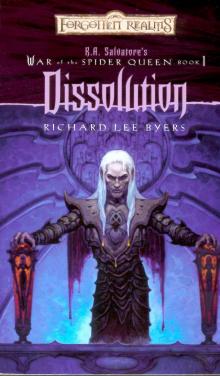 Dissolution
Dissolution Arkham Horror- Ire of the Void
Arkham Horror- Ire of the Void The Haunted Lands: Book II - Undead
The Haunted Lands: Book II - Undead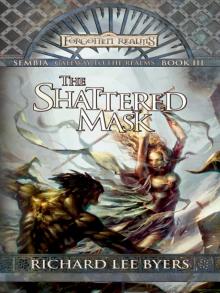 The Shattered Mask
The Shattered Mask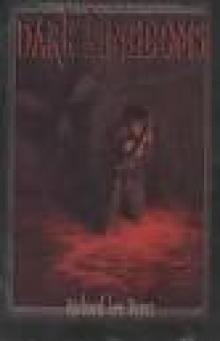 Dark Kingdoms
Dark Kingdoms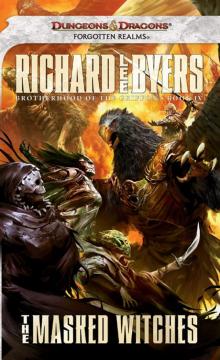 The Masked Witches: Brotherhood of the Griffon, Book IV
The Masked Witches: Brotherhood of the Griffon, Book IV The Plague Knight and Other Stories
The Plague Knight and Other Stories Unclean: The Haunted Lands
Unclean: The Haunted Lands The Captive Flame: Brotherhood of the Griffon • Book 1
The Captive Flame: Brotherhood of the Griffon • Book 1 The Taste of Waterfruit and Other Stories (Story Portals)
The Taste of Waterfruit and Other Stories (Story Portals)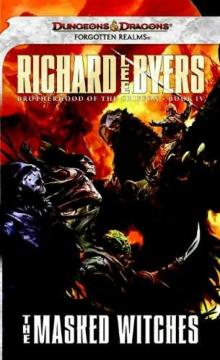 The masked witches botg-4
The masked witches botg-4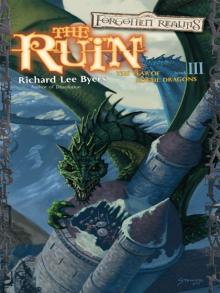 The Ruin
The Ruin The Spectral Blaze botg-3
The Spectral Blaze botg-3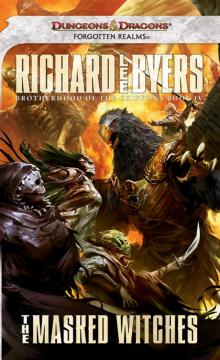 The Masked Witches
The Masked Witches Blind God's bluff bf-1
Blind God's bluff bf-1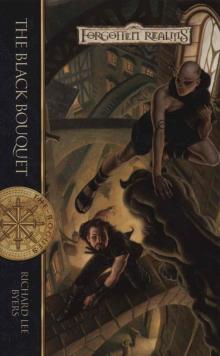 The Black Bouquet r-2
The Black Bouquet r-2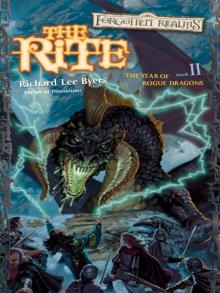 The Rite
The Rite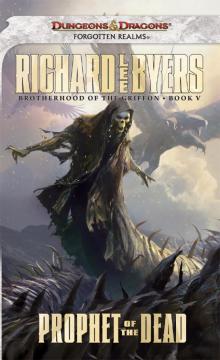 Prophet of the Dead: Forgotten Realms
Prophet of the Dead: Forgotten Realms The Shattered Mask s-3
The Shattered Mask s-3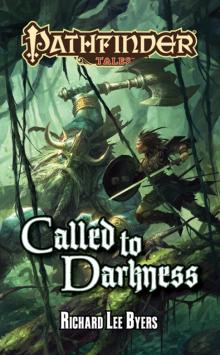 Called to Darkness
Called to Darkness Undead hl-2
Undead hl-2 Blind God's Bluff: A Billy Fox Novel
Blind God's Bluff: A Billy Fox Novel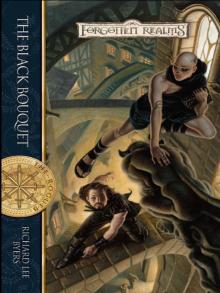 The Black Bouquet
The Black Bouquet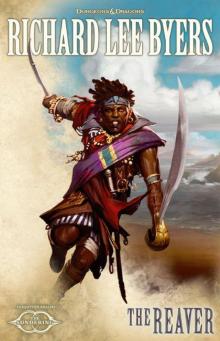 The Reaver
The Reaver The Spectral Blaze: A Forgotten Realms Novel
The Spectral Blaze: A Forgotten Realms Novel Queen of the Depths
Queen of the Depths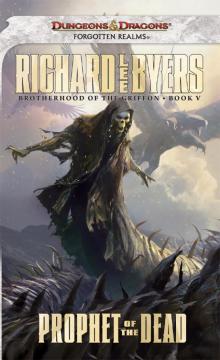 Prophet of the Dead botg-5
Prophet of the Dead botg-5 Whisper of Venom: Brotherhood of the Griffon, Book II
Whisper of Venom: Brotherhood of the Griffon, Book II The Captive Flame botg-1
The Captive Flame botg-1 The Haunted Lands: Book III - Unholy
The Haunted Lands: Book III - Unholy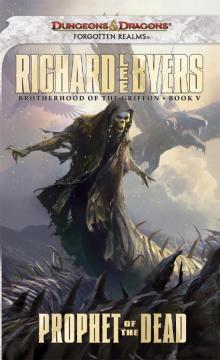 Prophet of the Dead
Prophet of the Dead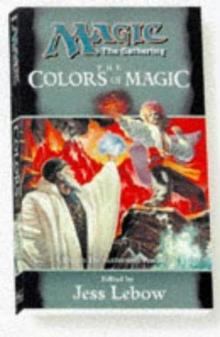 The Colors of Magic Anthology (magic: the gathering)
The Colors of Magic Anthology (magic: the gathering) Unholy hl-3
Unholy hl-3 Unclean hl-1
Unclean hl-1 Blind God's Bluff
Blind God's Bluff Whisper of Venom botg-2
Whisper of Venom botg-2 The Spectral Blaze
The Spectral Blaze